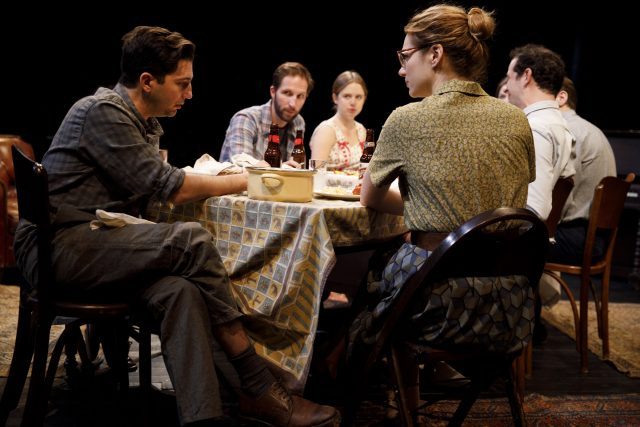
Joe Papp (John Magaro, left) discusses his theatrical vision in Richard Nelson’s Illyria at the Public Theater (photo by Joan Marcus)
Anspacher Theater, the Public Theater
425 Lafayette St. at Astor P.
Tuesday through Sunday through December 10, $75
212-539-8500
publictheater.org
Since 2010, Chicago-born playwright Richard Nelson has been a fixture at the Public Theater, presenting the four-part Apple Family saga and the three-part series about the Gabriel clan, including The Hopey Changey Thing from the former and Women of a Certain Age in the latter. The Obie and Tony winner now turns his attention to the history of the Public itself with Illyria, a surprisingly bland look at the development of Public founder Joe Papp’s master plan, bringing free Shakespeare to the people of New York City. The play takes place between April and August 1958, moving from the Green Room in Heckscher Auditorium to Colleen Dewhurst’s (Rosie Benton) apartment and then to a temporary stage on the Belvedere lawn in Central Park. It starts with a very funny anecdote about George C. Scott having just told a kid during a children’s showing of As You Like It to shut up. That is followed shortly by a wonderful scene in which young actress Mary Bennett (Naian González Norvind) auditions for the part of Olivia in Twelfth Night and is undeservedly given short shrift by Papp (John Magaro), who wants to his wife, Peggy (Kristen Connolly), for the role. Unfortunately, the rest of the play deals with relatively uninteresting backstage drama as the Papps, Dewhurst, press agent Merle Debuskey (Fran Kranz), director Stuart Vaughan (John Sanders), his wife and assistant, Gladys Vaughan (Emma Duncan), musician and composer David Amram (Blake DeLong), and stage managers John Robertson (Max Woertendyke) and Bernie Gersten (Will Brill) discuss various elements of creating quality theater within budgetary limitations. They needle one another, disagree on specific plans, talk about Lincoln Center and Stratford, fight over two hundred bucks, share gossip, and eat sandwiches. At one point Papp tells John, “Don’t be sentimental.” But Illyria, named for a location in Twelfth Night, is idealistic to a fault; Nelson, who also directs the play, leaves too much out, primarily concentrating on small tidbits that don’t shed enough light on the birth of the New York Shakespeare Festival. It all comes off as a show by insiders, for insiders. “Some are born great, others achieve greatness, and some have greatness thrust upon ’em,” Malvolio says in Twelfth Night, reading a letter from Maria. In Illyria, it is hard to distinguish where the greatness of Joe Papp came from.